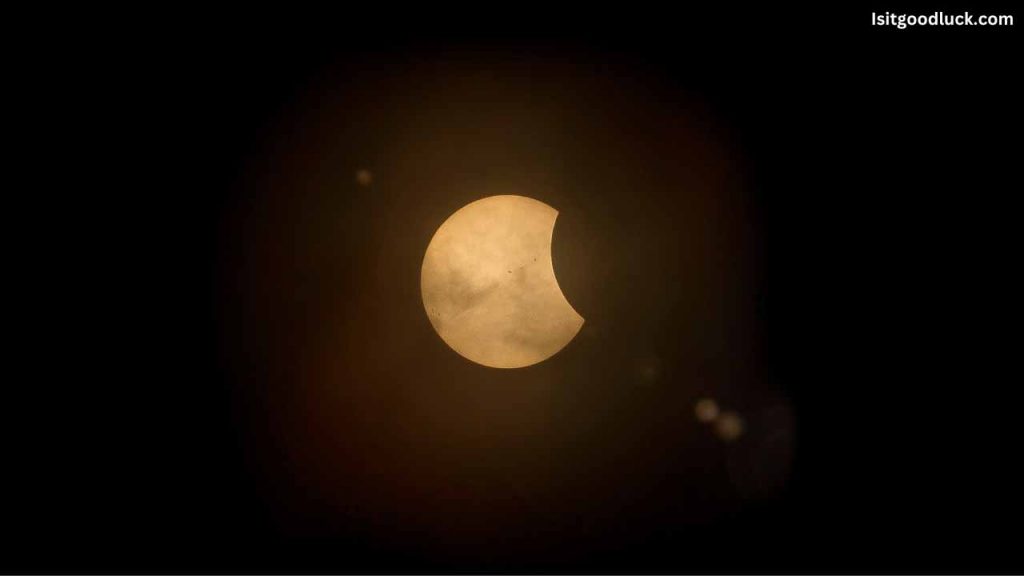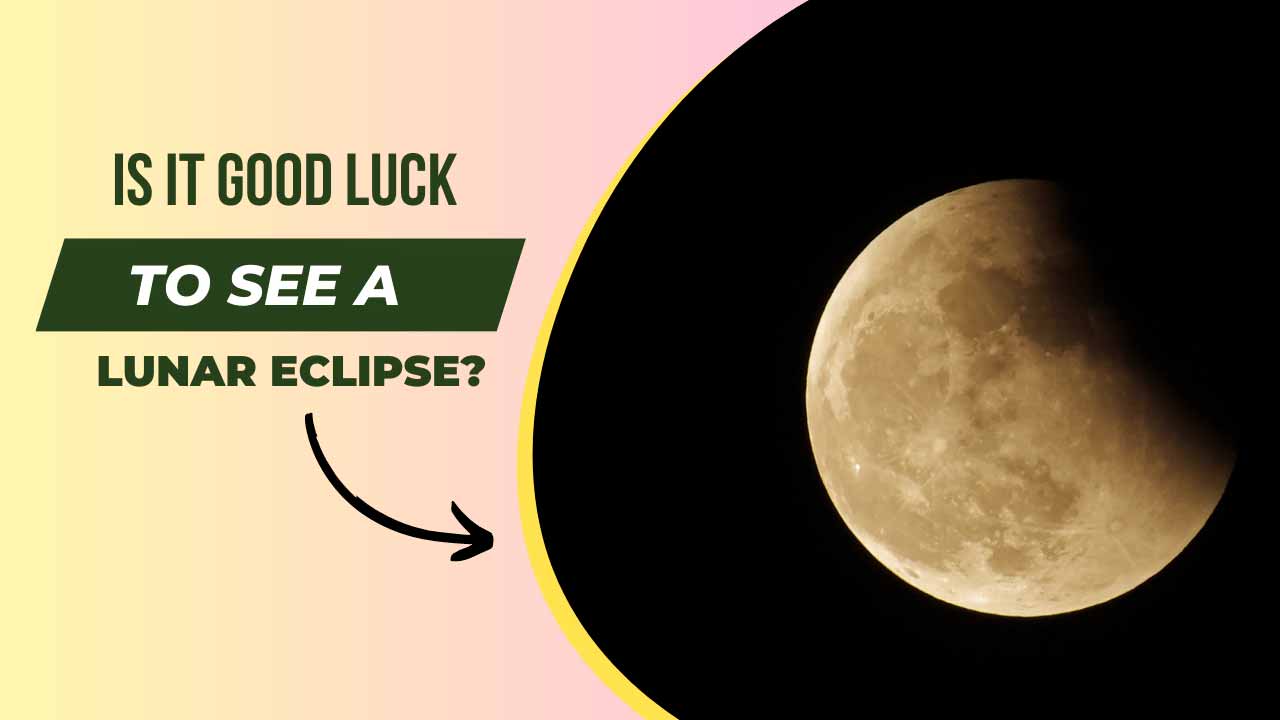The universe inspires awe, piquing our interest through celestial events such as lunar eclipses.
These natural occurrences transpire when the Moon travels through Earth’s shadow during a full moon, leading to unique visual experiences that depend on how much of the Moon’s surface is obscured.
The event can manifest as a “blood moon” if the Moon is entirely in the Earth’s shadow or as a partial eclipse if only a portion of the Moon travels through the shadow.
Historically, lunar eclipses have been associated with various superstitions and religious beliefs, with some cultures viewing them as an omen of bad luck.
Contents
- 1 The Science of Lunar Eclipses:
- 2 Superstitions and Beliefs about Lunar Eclipses:
- 3 Is it Good Luck to See a Lunar Eclipse?
- 4 Conclusion
- 5 FAQs
- 5.1 What other beliefs are associated with a lunar eclipse in different cultures?
- 5.2 How often do lunar eclipses happen, and when can I see the next one?
- 5.3 Can I watch a lunar eclipse without protective eyewear?
- 5.4 What’s the significance of the red color during a total lunar eclipse?
- 5.5 Are there any special rituals or practices to be followed during a lunar eclipse?
The Science of Lunar Eclipses:
Before delving into the cultural beliefs surrounding lunar eclipses, let’s first explore the science behind this intriguing phenomenon.
A lunar eclipse transpires when the Moon passes through the Earth’s shadow, consisting of the umbra and the penumbra. The umbra, the darkest part of the shadow, causes the Moon to disappear entirely during a total lunar eclipse.
Conversely, the penumbra, a lighter segment of the shadow, makes the Moon appear partially eclipsed.
The duration and type of a lunar eclipse rely heavily on the alignment of the Sun, Earth, and Moon. A perfect alignment, with the Moon traversing directly through the center of Earth’s shadow, results in a total lunar eclipse.
Also read: Is it Good Luck to Find a Ring?
A less precise alignment, with the Moon skimming the edge of the Earth’s shadow, leads to a partial lunar eclipse.
The length of a lunar eclipse can range from 45 minutes to 1 hour and 45 minutes for a total eclipse and between 30 minutes to 2 hours for a partial eclipse.

Superstitions and Beliefs about Lunar Eclipses:
For centuries, lunar eclipses have been laden with superstitions and religious beliefs, varying significantly across different cultures.
In certain parts of India, lunar eclipses are thought to bring bad luck, leading to people abstaining from activities like eating, bathing, or going outside during the occurrence. It is also necessary to take a bath once the lunar eclipses is over.
Thus, cultural interpretations of lunar eclipses span a broad spectrum, ranging from signs of ill luck to indications of prosperity and fertility.
Is it Good Luck to See a Lunar Eclipse?
The essential question is whether seeing a lunar eclipse brings good luck. From a scientific perspective, no evidence supports the notion that viewing a lunar eclipse influences luck, either positively or negatively.
Nevertheless, these beliefs persist within various cultures, demonstrating the enduring impact of historical and cultural superstitions on contemporary attitudes.
For those with superstitious beliefs, it might be preferable to avoid viewing a lunar eclipse. Conversely, if you do not subscribe to such beliefs, you can marvel at the grandeur and beauty of this natural phenomenon without any apprehensions.
Conclusion
Lunar eclipses are a captivating celestial event that has drawn the fascination of humans for centuries.
While science provides a clear understanding of the mechanics behind lunar eclipses, cultural beliefs and superstitions continue to shroud these occurrences in mystery, attributing them with the power to influence our luck.
Despite the lack of scientific evidence to corroborate these claims, they sway certain societal sections.
If you are intrigued by lunar eclipses, numerous online resources and libraries offer extensive information. Moreover, the advent of technology now allows us to witness these mesmerizing events live online.
Whether viewed as a harbinger of luck or just an awe-inspiring astronomical phenomenon, lunar eclipses undoubtedly remind us of our wondrous universe.
Also read other articles regarding good luck
FAQs
What other beliefs are associated with a lunar eclipse in different cultures?
In addition to being seen as good or bad luck, lunar eclipses have been connected with many beliefs worldwide. Some cultures consider them as an indication of significant change or transformation. In certain ancient civilizations, they were regarded as a time when deities were angered. For instance, in the Inca Empire, a lunar eclipse was seen as the Moon being attacked by a mythical jaguar. They would shout, shake their weapons, and make their dogs howl and bark, hoping to scare off the beast.
How often do lunar eclipses happen, and when can I see the next one?
Lunar eclipses occur at least twice a year but can happen up to five times yearly. The frequency depends on the Earth’s and Moon’s positioning and orbit. Check with local planetariums or online astronomical calendars to find out when you can see the next lunar eclipse.
Can I watch a lunar eclipse without protective eyewear?
Yes, you can watch a lunar eclipse without any protective eyewear. Unlike solar eclipses, which can harm your eyes if you look directly at them, lunar eclipses are entirely safe to observe with the naked eye.
What’s the significance of the red color during a total lunar eclipse?
The reddish color seen during a total lunar eclipse, often called a “blood moon,” is caused by the Earth’s atmosphere. When the Moon is entirely in Earth’s shadow, indirect sunlight passes through Earth’s atmosphere, bending towards the Moon. The atmosphere filters out most of the blue light, leaving predominantly red light, illuminating the Moon, and creating a distinctive blood-red hue.
Are there any special rituals or practices to be followed during a lunar eclipse?
Different cultures have various rituals and practices for lunar eclipses. For instance, some people in India chant mantras, perform special prayers or donate to charity during or after an eclipse. However, these rituals are cultural and hold no scientific basis. Carrying out regular activities during a lunar eclipse is completely safe and normal.





